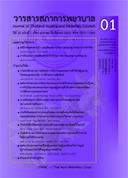Illness Representations and Quality of Life of Older People with Benign Prostatic Hyperplasia: A Correlational Study
Keywords:
illness representation, quality of life, benign prostatic hyperplasia, older peopleAbstract
Abstract:
Objective: To examine any correlation between illness representations and quality of life in older benign prostatic hyperplasia (BPH) patients.
Design: Descriptive correlational research.
Methodology: The participants were 383 BPH patients aged 60 years and older receiving medical care at the outpatient departments of four hospitals under the Bangkok Metropolitan Administration. Data were collected using the Illness Representation Scale and Quality of Life Scale. The data were analysed using descriptive statistics, and correlation-tested using Spearman’s Rank Correlation.
Results: The older BPH patients displayed a high degree of illness representations concerning disease characteristics, illness duration, personal means of illness control, illness control via medical treatment, mental association with the illness, and risk factors. The patients’ overall quality of life was moderate, whilst their wellbeing dimension of quality of life was high. Through their reflection, the patients identifed the consequences of their illness as disrupting their activities (r = -.102, p < .05). The consequences of the illness, illness duration, emotional health, and risk factors were signifcantly related to the patients’
wellbeing dimension of quality of life (r = .103, .145, .128, .126, p < .05, respectively). The patients’ representations of disease characteristics and risk factors were signifcantly related to their sexuality dimension of quality of life (r = -.147 and -.112, p < .05, respectively).
Recommendations: Some older people have misconceptions about causes of illnesses. Nurses are advised to provide health education for older BPH patients to help them develop a correct understanding of their disease, adopt proper self-management methods, and achieve better quality of life.
Downloads
References
1. Pietrzyk, B., Glinianowicz, MO., Owczarek, A., Gabryelewicz, T., Rachtan, AA., Prajsner, A., et al. Depressive symptoms in patients diagnosed with benign prostatic hyperplasia. Int Urol Nephrol
2015;47(3):431-40.
2. Ministry of Public Health. Bureau of Policy and Strategy. Public health statistics A.D.2015. Bangkok Samchareon Phanich (bangkok); 2015. (in Thai)
3. McNicholas, T., Swallow, D. Benign prostatic hyperplasia. Surgery 2011;29(6):282-6.
4. Van Kerrebroeck, P., Dmochowski, R., FitzGerald, M., Hashim, H., Norgaard, J., Robinson, D. et al. Nocturia research: current status and future perspectives. Neurourol Urodyn 2010;29(4):623-8.
5. Speakman, MJ., Cheng, X. Management of the complications of BPH/BOO. Ind J Urology 2014;
30(2):208-13.
6. Lukacs, B., Comet, D., Grange, J., Thibault, P. Construction and validation of a shortform benign prostatic hypertrophy health-related quality-of-life questionnaire. Br J Urol 1997;80(5):722-30.
7. Fourcade, R., Lacoin, F., Slama, A., Gaudin, A., Le Fue, C., Michel, E., et al. Impact of benign prostatic
hyperplasia (BPH) on medically treated patients' quality of life. Urology 2010;76(3):55.
8. Benzo, RP., Abascal-Bolado, B., Dulohery, MM. Self-management and quality of life in chronic obstructive pulmonary disease (COPD): The mediating effects of positive affect. Patient Educ Couns
2016;99(4),617-23.
9. Spain, L., Tubridy, N., Kilpatrick, T., Adams, S., Holmes, A. Illness perception and health-related
quality of life in multiple sclerosis. Acta Neurol Scand 2007;116(5):293-9.
10. Leventhal, H., Leventhal, E., Breland, J. Cognitive science speaks to the “Common Sense” of chronic illness management. Ann Behav Med 2011;41:152-63.
11. Moss-Morris, R., Weinman, J., Petrie, K., Horne, R., Cameron, LD., Buick, D. The Revised Illness
Perception Questionnaire (IPQ-R). Psychol Health 2002;17:1-16.
12. Traeger, L., Penedo, FJ., Benedict, C., Dahn, JR., Lechner, SC., Schneiderman, N, et al. Identifying
how and for whom cognitive-behavioral stress management improves emotional well-being among
recent prostate cancer survivors. Psychooncology 2013;22(2):250-9.
13. Petrie, K., Jago, L., Devcich, D. The role of illness perceptions in patients with medical conditions.
Behav Med 2007;20:163-7.
14. Tuokko, H., Hadjistavropoulos, T. An assessment guide to geriatric neuropsychology. 1st ed. N.J.
London: Lawrence Erlbaum Associates; 1998.
15. Brislin RW. Back-translation for cross-cultural research. J Cross Cult Psychol. 1970;1(3):187-216.
16. MacInnes, J. An exploration of illness representations and treatment beliefs in heart failure. J Clin Nurs
2014;23(9-10):1249-56.
17. Scharoo, M., Kaptein, A., Schlosser, M., Harry, P., Bel, E., Rabe, K., et al. Illness perception and quality
of life in patients with chronic obstructive pulmonary disease. J Asthma 2007;44(7):575-81.
18. Ji, H., Zhang, L., Li, L., Gong, G., Cao, Z., Zhang, J., et al. Illness perception in Chinese adults with
epilepsy. Epilepsy Res 2016;128:94-101.45
19. Iwarsson, S., Wahl, H., Nygren, C. Challenges of cross-national housing research with older persons:
Lessons from the enable-age project. Eur J Ageing 2004;1(1):79-88.
20. Batista-Miranda, J., De la Cruz Diez, M., Arano Bertran, P., Villavicencio, H. Quality-of-life assessment in
patients with benign prostatic hyperplasia: Effects of various interventions. Pharmacoeconomics 2001;
19(11):1079-90.
21. Fourcade, R., Theret, N., Taieb, C. Profle and management of patients treated for the frst time for
lower urinary tract symptoms/benign prostatic hyperplasia in four European countries. BJU
International 2008;101(9):1111-8.
22. Chaboyer, W., Lee, B., Wallis, M., Gillespie, B.,Jones, C. Illness representations predict health-related
quality of life 6 months after hospital discharge in individuals with injury: a predictive survey. J Adv
Nurs 2010;66(12):2743-50.
23. Hagger, M., Orbell, S. A meta-analytic review of the common-sense model of illness representations. Psychol Health 2003;18(2):141-84.
24. Dimitraki, G., Karademas, E. The association of type 2 diabetes patient and spouse illness representations
with their well-being: a dyadic approach. Int J Behav Med 2014;21(2):230-9.
25. Cartwright, T., Endean, N., Porter, A. Illness perceptions, coping and quality of life in patients with alopecia.
Br J Dermatol 2009;160(5):1034-9.
26. Beinke, K., O’Callaghan, F., Morrissey, S. The impact of social constraints and sense of coherence
on the psychological adjustment of adolescents and young adults with CF. Cogent Psychology 2015;2(1):1019237.
27. Stamogiannou, I., Grunfeld, E., Denison, K., Muir, G. Beliefs about illness and quality of life among men with erectile dysfunction. Int J Impot Res 2005;17(2):142-7.








